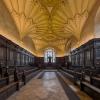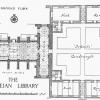Chancellor's Court, 1634-7
External links
Commentary
Image 3. Exterior entrance, Chancellor's Court, 25 Feb. 2017. Photo: Howard Hotson, CC BY-SA 4.0.
Laudian Statues (1636) on the Chancellor's Court (prescribed source)
TITLE XXI. Of the Courts of Justice.
CHAPTER 1. Of Preserving the Jurisdiction of the University.
Whereas, not only in conformity with the privileges granted and indulged by the most serene monarchs of this renowned realm, and its prelates (out of a gracious regard to the quiet of the students), but also according to a daily practice overreaching the memory of man, the power of entertaining and determining all causes which in anywise concern scholars and other privileged persons (saving cases of freehold, felony, and treason) regards and belongs to the jurisdiction of the Chancellor of the University, it is enacted, that no scholar or privileged person shall, in respect of any cause terminable within the University, convent any person in any court foreign to the University (except in observance of the order of appeal), nor submit himself of free-will to the jurisdiction of any other court, but shall, when impeached elsewhere, make known as early as possible to the Chancellor or Vice-Chancellor the suit wherewith he is threatened; and, in all possible ways be [218] scrupulously careful to preserve the University privileges in this behalf, under penalty, if the party offending be a scholar or privileged person, of being imprisoned and fined as a disturber of the peace; and if he persists in his contumacy, of being ousted of the University privileges. But every person who is not privileged and yet a townsman, and who has, in the cases above mentioned, threatened a scholar or privileged person with a suit, is to be restrained by being forbidden to deal with scholars and privileged persons till he makes satisfaction; but a stranger is to be imprisoned, if he can be caught, for a contempt of the University jurisdiction. The Chancellor also, and the Vice-Chancellor, and all others, are to understand that they respectively are tied and bound in virtue of their oath made to the University, to see, according to their authority and power, that the privileges of the University suffer no violence in this behalf.
CHAPTER 2. Of the Court of the Commissary or Vice-Chancellor of the University.
... once every week during term-time (and the vacations too), as long as the Vice-Chancellor deems it expedient, and in the afternoon of Fridays, a court shall be holden in the north chapel of the Church of St. Mary the Virgin,* or in some other place to be assigned by the Vice-Chancellor. The Commissary or Vice-Chancellor of the University, or his deputy, is to preside, with the assistance of the two proctors of the University for the time being, ....
In this court the Vice-Chancellor and his deputy shall proceed according to the rights, privileges, and customs of the University, and shall determine on matters conducing to the ordering of the causes and bringing them to a close....
* The statutes were published in 1636, the year before the purpose-built Chancellor's Court was opened underneath Selden End.
Source: Oxford University Statutes, translated by G. R. M. Ward, Volume 1: Containing the Caroline Code, or Laudian Statues, promulgated A.D. 1636 (London, 1845), pp. 217-18.
Further resources. A 3D panorama of the Chancellor's Court can be accessed here (via the Divinity School and Convocation House).


